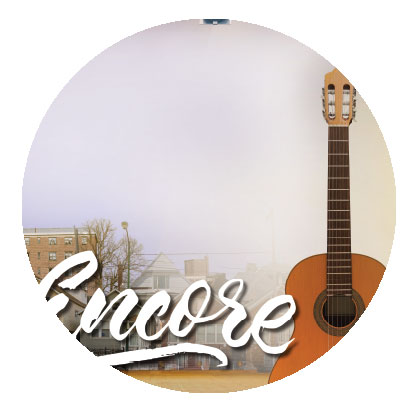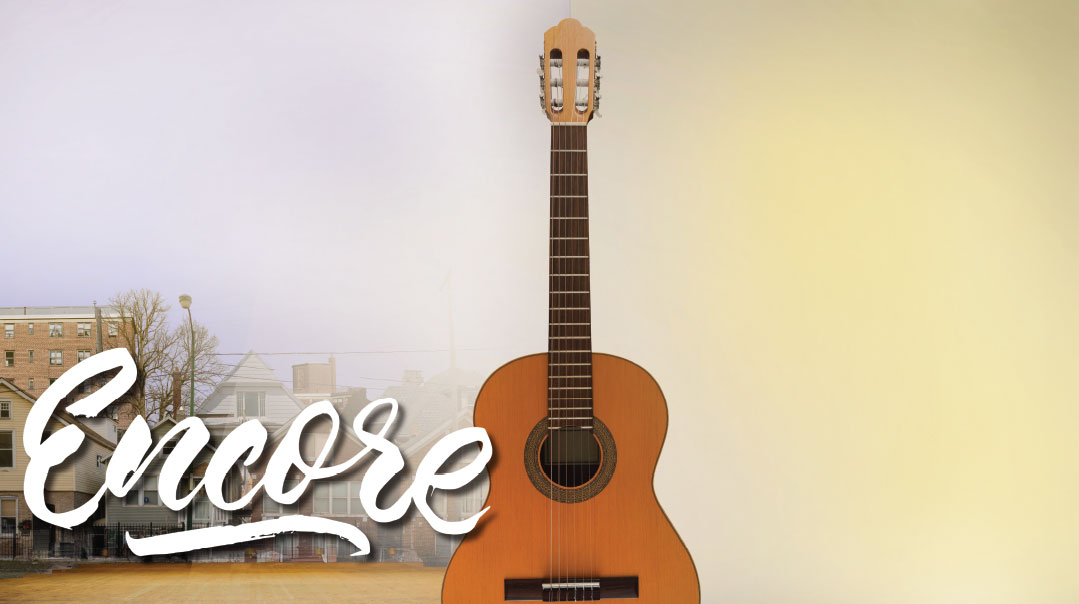Encore: Chapter 33

The idea that had seemed so good half an hour earlier now seemed outlandish and weird
S

The little boy shrugged, reaching into the pocket of his vest for an orange lollipop, and nodded. He would be just fine.
Sholom hurried back into the circle, grabbing the shoulders of the first two people he saw and resumed singing. Edus Hashem ne’emanah, ne’emenah, machkimas pesi.
There was nowhere he would rather be, and nothing he would rather be doing than jumping up and down in a huddle of people who felt the same way he did, consumed with love for the Torah and happy to express it. The shul wasn’t one he was used to. Penina’s cousin’s neighborhood was different from his shul, but Simchas Torah is Simchas Torah.
The men around him stopped moving, jumping in place as they repeated the high part again and again, Edus Hashem, ne’emanah, ne’emenah, machkimas pesi and Sholom jumped along with them.
It was special, but Sholom couldn’t stop the image from rising in his mind: a full beis medrash in Modena, New York, the old floorboards creaking in protest as bochurim jumped and danced, rebbeim and talmidim and alumni all celebrating their shared joy in the Torah they had learned. The yeshivah would have its songs, its minhagim and special traditions.
This was beautiful, this huge Lakewood shul with the Jerusalem stone and thick carpet and trays of herring and bottles of whiskey lining the tables against the wall, but he wanted to do Simchas Torah in Modena, with his boys.
There were real waiters here, in uniforms. He wanted to be in yeshivah, with the high ceilings and thick, streaked windows letting the sun shine in.
One day, he knew, one day it would happen.
Shlomo Bass didn’t really know anyone in shul. The shul in which he’d grown up had been his father’s shul, and once Tatty had gone and Reb Zalman had shuffled in as the new head of the household, they’d switched shuls.
This was smaller, more of a shtibel. Reb Zalman had fit right in, but Shlomo had never grown comfortable there. His mother told him he could go back to Zichron Dovid, but that would be awkward. He imagined Tatty’s friends looking him up and down.
“Check it out, Pinchas Bass’s boy, he looks okay,” Berkowitz would say.
Glober would shrug and say, “Pinchas wouldn’t go for the cool suit he’s wearing, come on.”
If Shlomo danced, they would remember how Tatty sat off to the side learning during hakafos. “Bereishis is a huge parshah, how can you hope to be maavir sedra properly if you don’t start on time?” Tatty would ask Shlomo, reminding him that there was no mitzvah to get all sweaty and that the shul wasn’t an exercise course.
If Shlomo came to that shul and didn’t dance, then they would say it was the effects of the divorce and the poor boy was probably depressed, they hoped he was seeing someone. These days there were excellent options, plenty of frum therapists who really got it.
So he was safer in Reb Zalman’s little basement shtibel, where the air was heavy with the smell of perspiration and wet wool and burned kugel and no one cared that he was Pinchas Bass’s son.
No one stopped dancing when the bochurim came in. Someone offered them cold drinks, which they accepted as they stood at the bottom of the carpeted stairs leading up to the Rav’s house and looked around the small room.
“There he is, there’s Bass,” Halbfinger said, pointing to a corner.
The idea that had seemed so good half an hour earlier now seemed outlandish and weird. Bass would look at them strangely and besides, who had energy to talk for another 45 minutes?
Shlomo Bass saw them and he raised his eyebrows and blushed. Then he tentatively made his way through the shul, not sure why they were there and if it was connected to him. It was just one more part of the story that had started with Lorb and Wagner sleeping over and then the trip to Great Adventure and then the kumzitz in his succah. He’d never imagined anything quite like it — had never dared — but at some point, he’d stopped worrying that it was a major chesed initiative someone had thought up.
It was when Lorb had quietly said, “Play ‘Im Eshkachech,’ ” and Shlomo found his fingers dancing up the guitar strings, getting ready.
If someone had laughed, made any sort of joke, at that time, he would have put down the guitar. But no one did. They seemed to understand that this was real, and they just listened.
For half an hour, he played the song and they sang, and if Wagner’s father hadn’t called to insist that they leave for Detroit at that very moment, they would have stayed longer.
Mommy had been upset that no one had videoed it, but Shlomo was fine. The memory was better than any video.
He reached the edge of the shul. “Hey, gut Yom Tov, what’s up? What brings you guys to this part of the world?”
Halbfinger leaned in. “We had a shtickel idea. And we figured why not, you’re not that out of the way, so efsher you join us?”
Shlomo Bass listened. Reb Zalman, his face nearly obscured by his tallis, looked on and noted that Shlomo was either trying to suppress a smile, or perhaps he wasn’t even aware that the smile was there.
Sholom Wasser lifted Kalman high in the air and spun around. He didn’t know most of the people in the shul, though they’d been pleasant enough over Yom Tov, but he didn’t need friends to enjoy hakafos. He was fine.
Penina had planned to stay home, since she didn’t know anyone in the neighborhood. She said she would come by if the girls got jumpy, but otherwise she was fine.
The gabbai, a well-dressed man with prematurely gray hair, approached to call Sholom up for a hakafah.
“Mechubad, the Rosh Yeshivah,” the gabbai said in a cheerful voice and Sholom smiled gamely. The men in this shul knew what he did and they were having fun with it.
He put down Kalman and accepted the sefer Torah, heavy, comforting, drawing it close to his heart and pressing the red velvet against his face.
Ashrei ha’am she’Hashem Elokav!
He went off to join the large circle, feeling a surge of ecstasy at the words themselves — Ashrei ha’am she’Hashem Elokav — and his good fortune at having Torah in his life.
Tears formed in his eyes as he danced, and he shut them tight, reveling in the moment.
He didn’t see the large double doors open and a small group, a few exhausted looking boys with shirts untucked and ties loose, come in to the large shul.
His talmidim had walked across Lakewood, there to join their rebbi for hakafos.
And when Sholom Wasser opened his eyes and saw them, he knew that he didn’t need a huge crowd in Modena. What he needed was this.
Just this.
A sefer Torah in his arms, his talmidim all around him dancing.
He smiled as they approached.
Ashrei ha’am she’Hashem Elokav!
to be continued…
(Originally featured in Mishpacha, Issue 816)
Oops! We could not locate your form.


